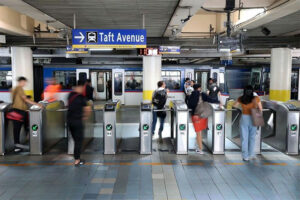By Ashley Erika O. Jose, Reporter
THE Department of Transportation (DoTr) is set to extend the maintenance contract of Sumitomo Corp. for the Metro Rail Transit Line 3 (MRT-3).
“We are just extending the maintenance contract of Sumitomo,” Transportation Undersecretary for Railways Timothy John R. Batan said in a Viber message to BusinessWorld on Wednesday.
The contract is scheduled to expire in July, coinciding with the end of the MRT-3’s build-lease-transfer (BLT) agreement with the Sobrepeña-led Metro Rail Transit Corp. (MRTC).
In 2023, Sumitomo and the MHI Group signed a 26-month maintenance contract with the DoTr, covering June 2023 to July 2025.
Apart from maintenance services, the agreement also covers the extension of the rail line, signal installation to the common station, and the expansion of the pocket track to increase train capacity, according to Sumitomo’s website.
Transportation Secretary Vivencio B. Dizon declined to disclose the duration of the extension, saying the government is still finalizing the terms.
Mr. Dizon said the government aims to conduct the bidding for MRT-3’s privatization within the year.
“We will push through with the bidding. We need to PPP MRT-3. That is the goal for this year,” he told reporters on the sidelines of a forum.
Under the current BLT concession, the DoTr holds the franchise and manages operations and fare collection, while MRTC built and maintains the system in exchange for regular payments from the government. Upon the contract’s expiration next month, ownership and operations of MRT-3 will be transferred to the government.
The DoTr had previously targeted privatizing MRT-3’s operations and maintenance before the MRTC contract lapses, but Mr. Dizon declined to provide a definitive timeline.
In January, the agency said it had tapped the Asian Development Bank to study privatization options for the MRT-3.
Rene S. Santiago, former president of the Transportation Science Society of the Philippines, said a solicited mode of procurement may not attract many bidders.
“DoTr has no choice but to bite the bullet. It could have been avoided, had the DoTr not rejected the proposal of Sumitomo-MPIC. Their consultant had boxed DoTr into solicited mode,” he said.
To recall, the PPP Center said the DoTr rejected Metro Pacific Investments Corp.’s (MPIC) unsolicited proposal for the MRT-3 project in December last year.
Nigel Paul C. Villarete, senior adviser on PPP at Libra Konsult, Inc., said that while solicited procurement often garners fewer bidders, it attracts qualified ones.
“The capable ones with sufficient capacity in expertise and experience as well as financing will always be interested,” he said in a Viber message.
For large-scale projects such as MRT-3’s operations and maintenance, a solicited procurement mode is the most viable option, Mr. Villarete said.
“Solicited mode contracts are more transparent and allow the selection of the best operator. Unsolicited ones will bind the government to an operator who might not be the best that we can have,” he said, noting that solicited procurement gives the government full control over the bidding process.
